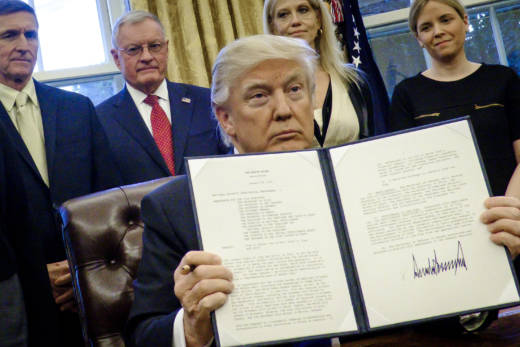"We have reached out to the White House to explain the negative effect on our coworkers and our company," he added.
Cook didn't say how many Apple employees are directly affected by the order, but said the company's HR, legal and security teams are in contact to support them.
"Apple would not exist without immigration, let alone thrive and innovate the way we do," Cook wrote — an apparent reference not only to the company's foreign-born employees, but to Apple co-founder Steve Jobs, the son of a Syrian immigrant.
Netflix CEO Reed Hastings was forcefully blunt.
"Trump's actions are hurting Netflix employees around the world, and are so un-American it pains us all," he wrote on Facebook . "Worse, these actions will make America less safe (through hatred and loss of allies) rather than more safe."
"It is time to link arms together to protect American values of freedom and opportunity," he continued.
Facebook founder Mark Zuckerberg criticized the order in similar, though more carefully couched, terms on Friday.
On Sunday, Lyft cofounders John Zimmer and Logan Green announced they would donate $1 million to the American Civil Liberties Union over the next four years "to defend our Constitution."
"Banning people of a particular faith or creed, race or identity, sexuality or ethnicity, from entering the U.S. is antithetical to both Lyft's and our nation's core values," Zimmer and Green said in a statement. "We stand firmly against these actions, and will not be silent on issues that threaten the values of our community."
Uber CEO Travis Kalanick, one of 19 corporate leaders chosen to serve as business advisors to Trump, stopped short of criticizing the president's order. But he noted in a blog post published Saturday that the travel ban will affect thousands of Uber drivers.
"This ban will impact many innocent people," Kalanick said, "an issue that I will raise this coming Friday when I go to Washington for President Trump’s first business advisory group meeting."
Technology investor Chris Sacca, an early backer of Uber and Instagram, said on Twitter that he would match ACLU donations up to $75,000 after the organization sued over the ban — and then decided to donate another $75,000 , for a total of $150,000.
EBay founder Pierre Omidyar, the child of Iranians, complained that the order was "simple bigotry ."
Tesla Motors and SpaceX founder Elon Musk, who has recently appeared to be cultivating a relationship with Trump, tweeted that "many people negatively affected by this policy are strong supporters of the U.S." who don't "deserve to be rejected." Musk is an immigrant from South Africa.
Google told its employees from those countries to cancel any travel plans outside the U.S. and to consult with the company's human resources department if they're not currently in the U.S., according to a companywide note described to The Associated Press. That memo was first reported by Bloomberg and the Wall Street Journal.
Google CEO Sundar Pichai told employees in the note that at least 187 Google workers could be affected by Trump's order. It is not clear how many of those workers are currently traveling outside the U.S. "We've always made our views on immigration known publicly and will continue to do so," Pichai said in the memo.
Company representatives declined to discuss the memo or to answer questions about the affected employees. In an official statement, Google said: "We're concerned about the impact of this order and any proposals that could impose restrictions on Googlers and their families, or that could create barriers to bringing great talent to the U.S."
Microsoft also said it is providing legal advice and assistance to its employees from the banned countries, noting they are all working in the U.S. lawfully.
The tech industry may be bracing for further immigration-related hits. Leaks of draft executive orders, still unverified, suggest that Trump might also revamp the H1-B program that lets Silicon Valley bring foreigners with technical skills to the U.S. for three to six years.
While the tech industry insists the H1-B program is vital, it has drawn fire for allegedly disadvantaging American programmers and engineers, especially given that the visas are widely used by outsourcing firms. Trump's attorney general nominee, Sen. Jeff Sessions, is a long-time critic of the program.
Venky Ganesan, a managing director at venture capitalist firm Menlo Ventures, acknowledged that the program is "not perfect" and subject to some abuse, but noted that it provides an invaluable source of skilled workers and plays a "pivotal" role in the tech industry.
"If we want to buy American and hire American, we do that best by creating companies in America," he said. :Having the best and brightest from all over the world come and create companies in America is better than them creating companies in India, Israel or China."
